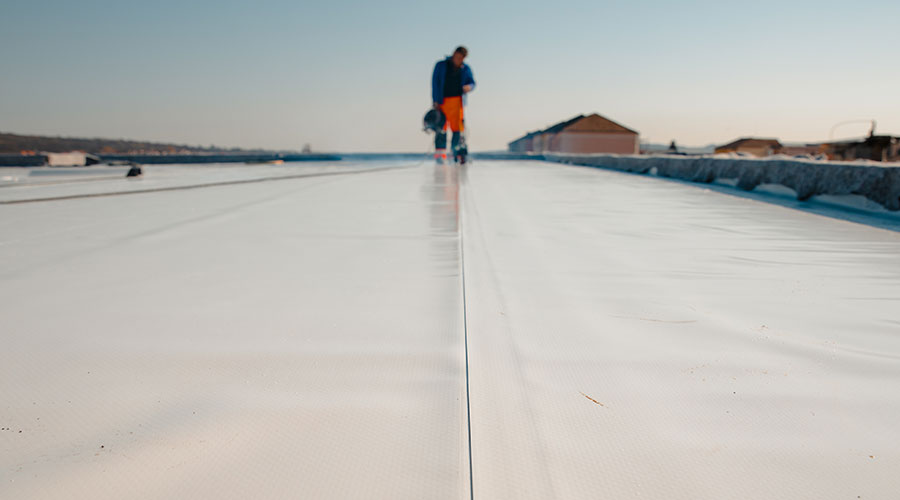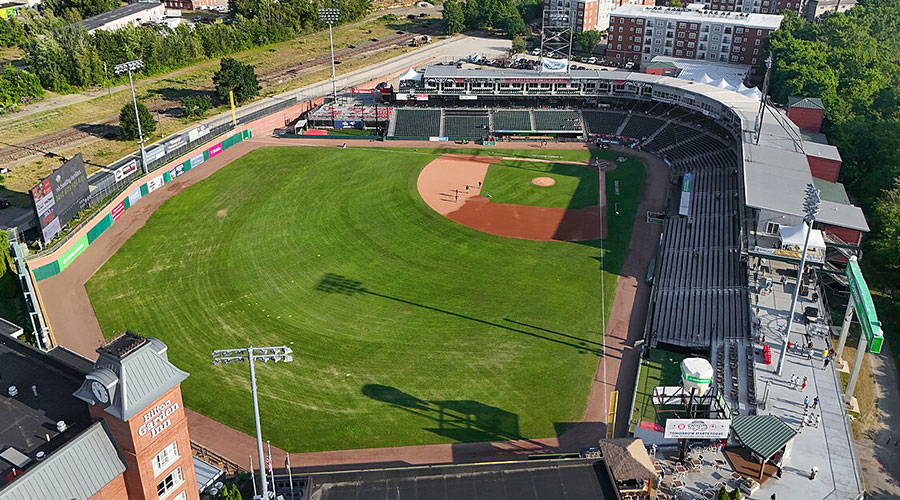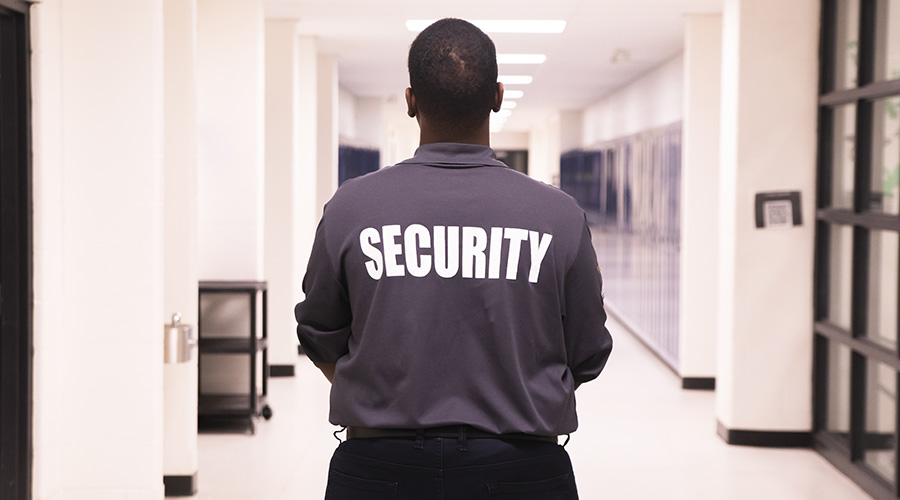Delta Dental Stadium Upgrades Security Monitoring
Successful security system upgrade delivers valuable benefits for New Hampshire minor league stadium.
By Dave Lubach, Chief Editor
From players to fans, baseball’s opening day is considered a special event for all involved. It is a sign that spring will soon be over and summer is around the corner.
Opening day is also revered by stadium employees who are excited to get back to the ballpark, show off any off-season upgrades and present optimal conditions for the team that will take the field that season.
Melissa Dallenbach enjoyed an extra-special special opening day in April 2024 when she started her job as the director of stadium operations at Delta Dental Stadium in Manchester, New Hampshire. The stadium is home to the Double A New Hampshire Fisher Cats, an affiliate of Major League Baseball’s Toronto Blue Jays.
While Dallenbach was excited to start her new position, she had larger issues on her mind beyond the baseball games. She realized that the security measures at the 5,500-seat stadium were lacking.
“I’m looking around and looking at everything, getting the keys and access to everything and I’m like, ‘What does the security camera look like?’” she says. “I’m asking if I have access to it because I needed it.”
That question led Dallenbach on a journey to upgrade security procedures and open doors to a wealth of data that ultimately helped stadium operations run more efficiently.
Necessary upgrades
Operations teams at stadiums and arenas often are challenged to keep occupants safe and systems running smoothly. It is hard to keep an eye on every nook and cranny in a facility typically filled with thousands of occupants and ensure they are not resorting to vandalism and violence.
The challenge is greater for stadiums at the minor league baseball level, where the staffs for maintenance and security are not as those at major league stadiums. The minor league sports experience typically promotes a family-oriented atmosphere that includes more than just the game unfolding on the field.
Before Dallenbach arrived, Delta Dental Stadium’s security standards complied with the Professional Development League, which oversees minor league baseball. That standard does not mean they matched her expectations.
“It was very rudimentary,” she says. “We needed to do an upgrade. We were getting a lot of false alarms, and we really didn’t know what was going on with those false alarms because somebody would open a door and set off an alarm. They were supposed to be there legitimately, but nobody turned off the alarms or had a code.
“We just didn’t know what was going on in certain areas because we only had cameras in limited areas.”
Areas of the stadium that are required to be monitored by cameras include the entry area, doors to the visiting and home clubhouses, umpire facilities, women’s locker rooms, parking lots, and player entry and exits to the stadium.
“Once a year the league comes around and inspects everything to look and make sure that we are compliant,” Dallenbach says.
While the basic security measures were in place, Dallenbach says she was looking for a service that is more user-friendly.
“I wanted to expand the view of what we could see, add more cameras and upgrade the system so I could be able to see it on my phone because sometimes, I’m not at my computer,” she says. “As a facilities manager or director, you know that you’re not necessarily at your computer all the time. You’re walking around the stadium, out looking for materials, at the store getting something, or you’re at home on a random offhour, and you need to know what’s going on because an alarm just went off.”
The stadium’s facilities team started the process of selecting a new security system at the end of the 2024 season and started installation in April, which finished two months later using primarily an in-house team. The new system increased the number of security cameras from 12 to 23, and staff continues to install sensors, but Dallenbach says fewer sensors are needed than typically required due to the increased number of cameras.
“It was a slow process for us in regard to doing it ourselves and getting the stadium ready for baseball season,” she says. “But we ended up installing it with a little bit of outside help.”
Expanded options
Since the stadium was taking a step up with the new security system, Dallenbach thought it would be a good time to take the technology to another level.
After a month-long trial to test cameras to specify exactly what team officials wanted from the security system, they settled on an integrated security system from Verkada.
“That was huge for me because I actually got to see what it was like before I invested in the program,” Dallenbach says.
The cameras are already paying dividends. Early this season, a car was driving in a restricted area, so Dallenbach gave the recorded footage to the police, who were able to find the offender.
“There’s a police officer on site, so I immediately went to the officer, showed him the camera footage of the front gate area and the car driving through there, and they were able to find that car immediately, pull them over and talk to them about it,” she says.
The new system gave Dallenbach and her staff the ability to monitor stadium operations remotely, and it enabled staff to receive real-time alerts to act when trouble arose. The system also can directly integrate with local police to shorten response times and eliminate costly false alarms that had been a regular occurrence.
“One of the things I liked about the system that we went with was their new AI facial recognition,” she says. “If we have a fan that causes an issue, and we remove them from the stadium for whatever reason, we can put their picture on the camera system, and it will be at the front gate. We can automatically search for them, and I can get a text saying, so-and-so is entering the stadium.
“For a place like a baseball stadium, that’s huge to be able to not have to put up a picture on the wall in the box office and say, ‘That person isn’t allowed in.’”
Attendance analytics
Every die-hard baseball fan knows how much data analysis has impacted the game during recent years as more managers and general managers are turning to analytics to set batting lineups and the best way to deploy pitchers.
Thanks to the development of integrated systems like the new system at Delta Dental Stadium, data analysis also can help stadium operations people analyze crowd trends and patterns.
“We can see how many people are coming to the front gate at a certain time,” Dallenbach says.
Attendance data also has helped the Fisher Cats analyze and better plan start times for games.
“We have thought about changing game times or how to keep fans in the seats longer,” she says. “What do we need to do during the sixth inning to make them stay? There are a lot of analytics that go beyond just security in the security system.”
One interesting finding occurred during a so-called 603 promotion, which celebrated New Hampshire’s area code. The team started the game at 6:03 p.m. instead of its traditional 6:35 p.m.
From that experience, the team saw that more people stayed longer because the start time was 32 minutes earlier.
“It’s interesting to look at the entry points in that regard,” Dallenbach says. “Using the information that we’re getting from these cameras put into factual evidence of saying, if you move the game a half-hour earlier, you’re going to get families staying a little bit longer, especially on school nights,” Dallenbach says.
Dallenbach is a relative newcomer to facilities management after a career as a high school math teacher and an athletics director. For someone new to the profession, she says she found peace of mind in a reliable security system that delivers a solid return on investment.
“You know a lot more about what’s going on in the facility than you did before,” she says. “Before we had this system, there were a lot of things that happened that you just don’t know are happening in the stadium. It opens your eyes to what’s going on. Having more control over what’s going on and having more answers for people who are asking what’s going on, that was the biggest eye-opener for me.”
Dave Lubach is the chief editor for the facilities market. He has more than 10 years of experience writing about facility management and maintenance issues.
Related Topics:












